Alibaba
Latest
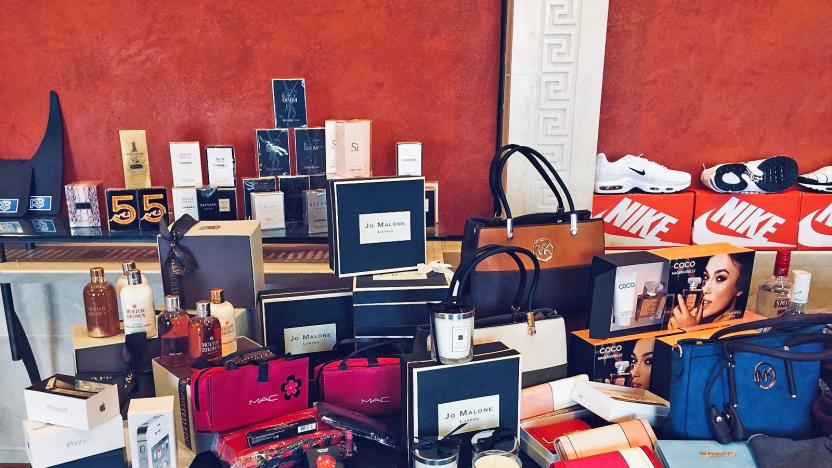
Amazon needs to get a handle on its counterfeit problem
Chances are you wouldn't suspect that whatever you're buying from Amazon, whether it be clothing, sunglasses or a handbag, is fake. And, for the most part, that tends to true. But that doesn't mean you should trust that every product is legit. In fact, right now if you search for "Yeezys," a highly coveted pair of Adidas shoes, you'll get more than a thousand results that are clearly fake. Two dead giveaways are design flaws and an unlikely low price -- trust me, Adidas doesn't sell them for $20. The worst part is that some of them bear the seemingly trustworthy Fulfilled by Amazon (FBA) label. But all that really means is that the company is acting as the middleman between you and the actual seller.
Edgar Alvarez05.31.2018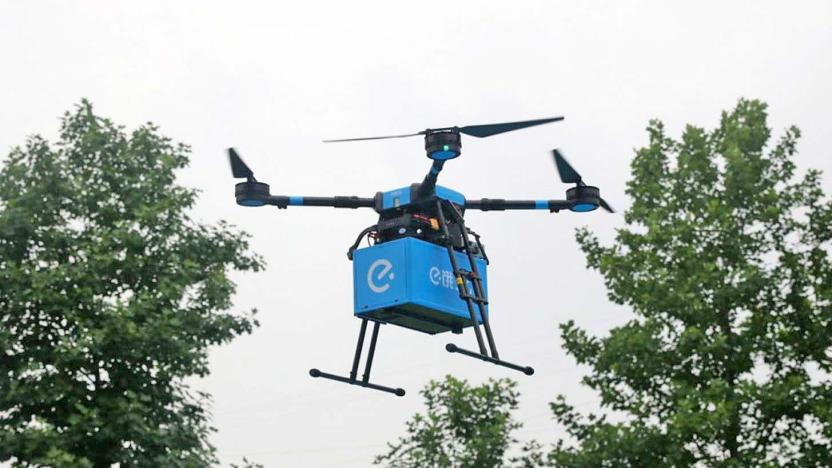
Food delivery drones take flight in China
You don't have to wait for food delivery drones... if you live in the right part of China. Alibaba's online meal giant Ele.me has been cleared to use drones for delivering orders in Shanghai's Jinshan Industrial Park. The initiative won't deliver directly to your abode, but it will save you a lot of travel time: there are 17 routes, each of with two fixed drop-off points. Your food should arrive within 20 minutes, which isn't always possible with conventional cars slogging through traffic.
Jon Fingas05.30.2018
Report reveals the extent of China's tech sexism problem
Chinese tech companies like Baidu and Alibaba have been using blatant sexism to attract job candidates and advertising jobs for "men only," Human Rights Watch (HRW) has reported. "Major companies like Alibaba have published recruitment ads promising applicants 'beautiful girls' as co-workers," said HRW China Director Sophie Richardson. Furthermore, Chinese authorities have not been enforcing laws that prohibit workplace gender discrimination, it adds.
Steve Dent04.23.2018
Alibaba is the latest Chinese internet giant to test self-driving cars
China's Alibaba Group has been testing its own autonomous vehicle technology, the South China Morning Post reports, and is looking to hire an additional 50 self-driving vehicle experts. Alibaba's rivals Baidu and Tencent have also been working on autonomous technology and last month, Baidu received the go-ahead from the Chinese government to begin testing its technology on Beijing roads. Tencent reportedly sent one of its autonomous vehicles for a ride on a Beijing highway earlier this month.
Mallory Locklear04.16.2018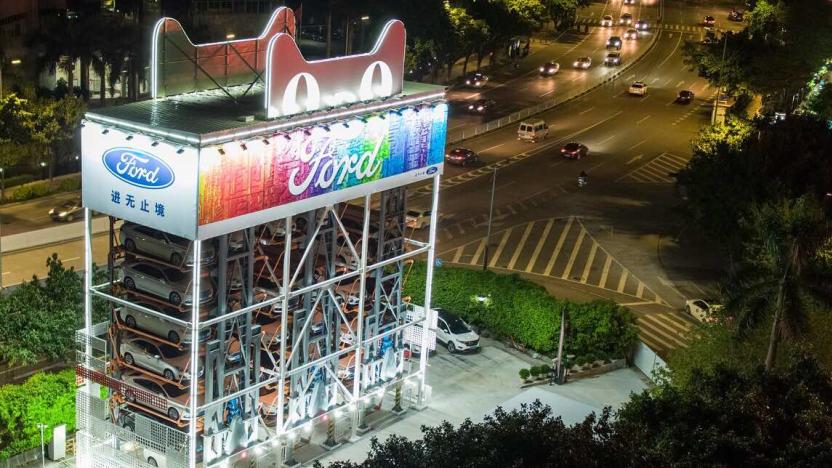
Ford vending machine begins dispensing cars in China
It is no longer enough simply to test-drive a vehicle by riding around the block while a salesperson gives you their well-rehearsed patter. Now, there needs to be some sort of theater around the purchase, or else how will you trick yourself into thinking that buying a car is fun? It's why Ford and Alibaba leapt into bed together to build a vending machine for cars that you can try before you buy.
Daniel Cooper03.26.2018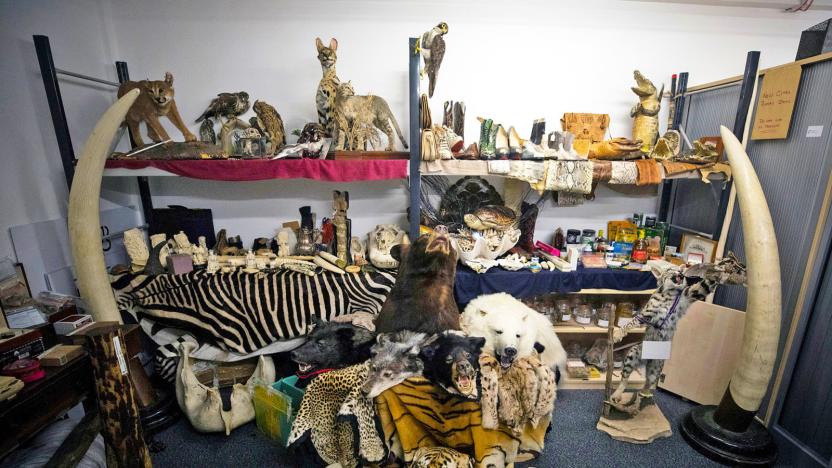
Tech giants like Google and Alibaba are working to save endangered species
Google, eBay and other technology leaders are aiming to protect the world's animals. Why? In a widely unregulated social-media world, many tech platforms have become a haven for the wildlife black market, a $20 billion industry. The sale of illegal animal goods -- from ivory to exotic pets -- is the fourth-largest criminal global trade industry behind narcotics, counterfeiting and human trafficking, according to TRAFFIC, a wildlife-trade-monitoring network. In the past decade, the sale of these goods and species has moved from illicit backroom dealings in stores to apps and online shopping ads.
Brian Mastroianni03.15.2018
Intel told Chinese firms of Meltdown flaws before the US government
Intel may have been working with many tech industry players to address the Meltdown and Spectre flaws, but who it contacted and when might have been problematic. Wall Street Journal sources have claimed that Intel initially told a handful of customers about the processor vulnerabilities, including Chinese tech companies like Alibaba and Lenovo, but not the US government. While the chip giant does have to talk to those companies to coordinate fixes, the Chinese government routinely monitors conversations like this -- it could have theoretically exploited the holes to intercept data before patches were available.
Jon Fingas01.28.2018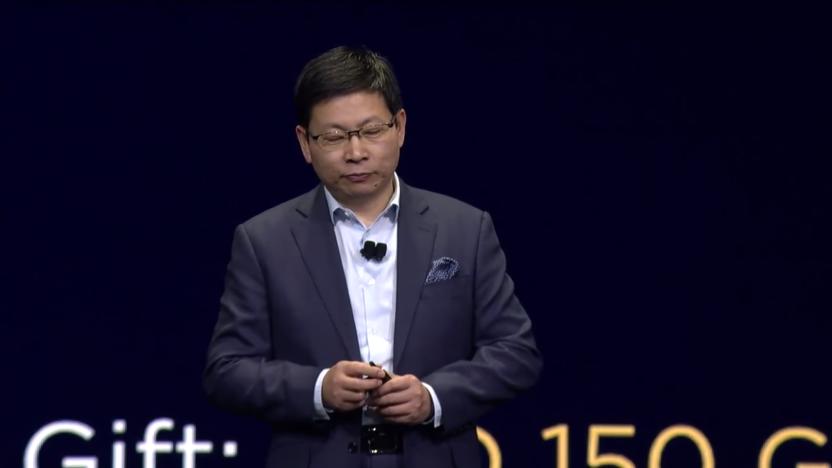
Huawei and its peers won't win over the US without trust
Standing in front of a slide simply titled "Something I want to share," the CEO of Huawei's consumer product division is about to break tradition. Richard Yu is going to directly address the reported partnership with AT&T that fell through at the last minute, pulling back the curtains, ever so slightly, on a business that is largely conducted behind closed doors. The Chinese electronics company recently overtook Apple as the world's second-largest smartphone maker in sales, but it still struggles to gain the approval of the American public.
Cherlynn Low01.17.2018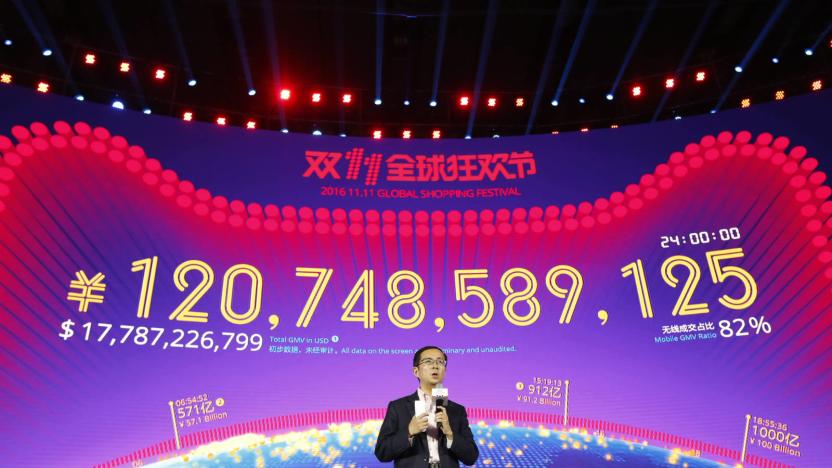
US continues to blacklist China’s eBay over counterfeit goods
Chinese e-commerce behemoth Alibaba's counterfeit goods problem refuses to go away. Despite noting improvements on takedown efforts, the Office of the US Trade Representative has again blacklisted Alibaba's eBay-like Taobao shopping site.
Saqib Shah01.15.2018
Alibaba and Microsoft AI beat human scores on Stanford reading test
20 years ago, IBM's Deep Blue beat Garry Kasparov in a game of chess and the practice of pitting human against computer continues to this day. Google's AI was the first to beat a Go champion a couple of years back (and it continues to teach itself how to play other games, too). Now Bloomberg reports that Alibaba and Microsoft have both developed AI that scores better than humans on a Stanford University reading test.
Rob LeFebvre01.15.2018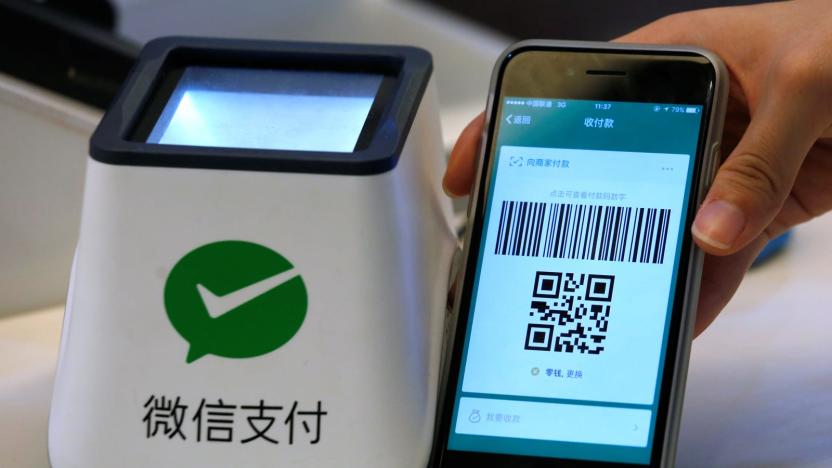
China will cap QR-code payments to tackle fraud
China's central bank is issuing regulations over QR-code-based payments. Paying for things by scanning a barcode with the Alibaba or WeChat app is more common than using cash in the region and now the government wants to keep closer tabs on where the money is going. You might laugh at the idea, but QR codes aren't the punchline in the east that they are here. For instance, plenty of cabbies prefer taking QR payments because it means they don't have to handle small change.
Timothy J. Seppala12.28.2017
Alibaba will sell cars with a vehicle vending machine
Chinese internet ecommerce giant Alibaba is still breaking online shopping records, but it's begun veering into physical sales, too. That the company is reportedly planning a shopping mall is in their retail wheelhouse, but last week's news was further afield: Alibaba will help sell Ford EVs in China. Part of that proposal included the intriguing concept of a gigantic vending machine to dole out cars -- which, to be fair, has been tried out before to alleviate parking woes. But it seems that wasn't a casual suggestion: A new video illustrates exactly how the revolving vehicle vendor will work as part of Alibaba's test drive experience.
David Lumb12.14.2017
Starbucks offers AR tours of its lavish Shanghai coffee shop
Starbucks has a long, long tradition of using tech to bring you into its coffee shops, and that will be truer than ever with the latest supersized Reserve Roastery location in Shanghai. The beverage behemoth will use a mobile app to offer guided augmented reality tours of the coffee-making process when the restaurant opens on December 6th. Point your phone at equipment like the roaster or cask and you'll get an explanation of what happens as beans eventually turn into your venti latte.
Jon Fingas12.04.2017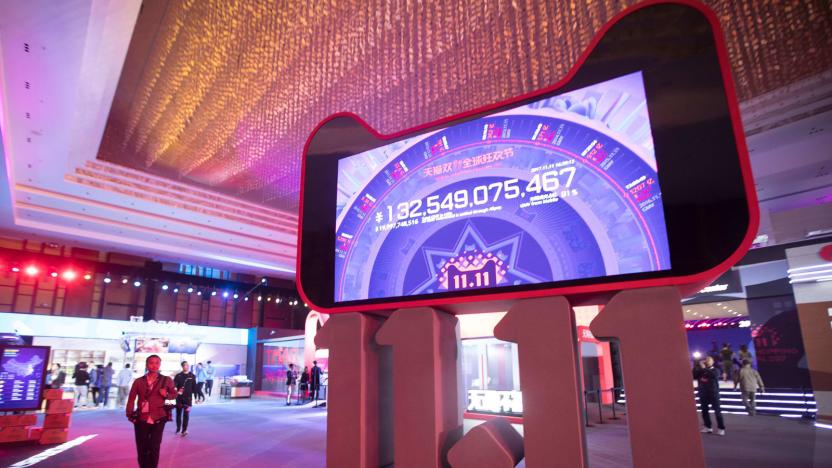
Internet giant Alibaba crushes one-day online shopping record
If you needed evidence that internet shopping still has room to grow, you just got it. Chinese e-commerce powerhouse Alibaba has confirmed that its annual Singles' Day sales event racked up the equivalent of more than $25.3 billion in sales, easily setting a record for the most online purchases in one day. For context, Alibaba sold just short of $18 billion last year -- this year, the company surpassed that figure slightly past the halfway mark. The 2016 Cyber Monday sale was downright tiny by comparison, mustering 'just' $3.45 billion in the US.
Jon Fingas11.11.2017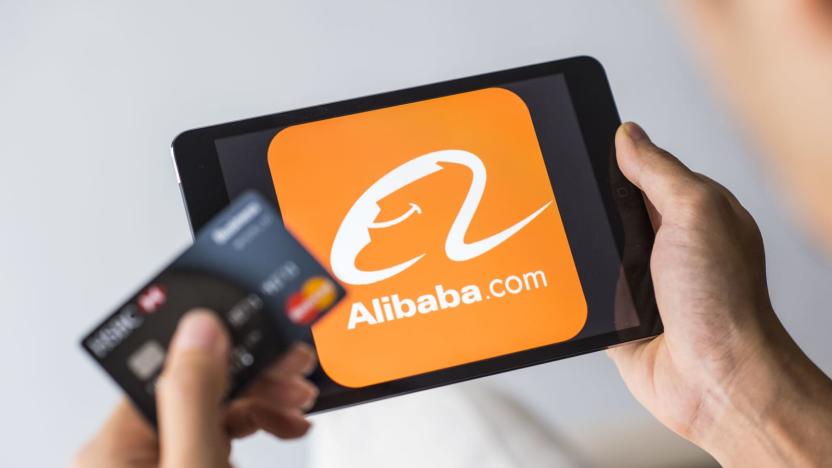
Alibaba reportedly plans to spend $15 billion on 'moonshot' projects
Research and development in the tech industry is a pretty big deal. Google spins off its massive advertising revenues into all sorts of wild projects aimed at finding the next big thing. Apple and Amazon both spend billions each year, too, with both companies building R&D centers around the glove. China's largest online commerce company, Alibaba, appears to be following suit, with a plan to more than double its research and development spending from $6.4 billion annually to $15 billion over the next three years, according to a report at Bloomberg. The expenditures will help fund next-generation technology discoveries and "moonshot" projects that could disrupt entire industries, Bloomberg says.
Rob LeFebvre10.11.2017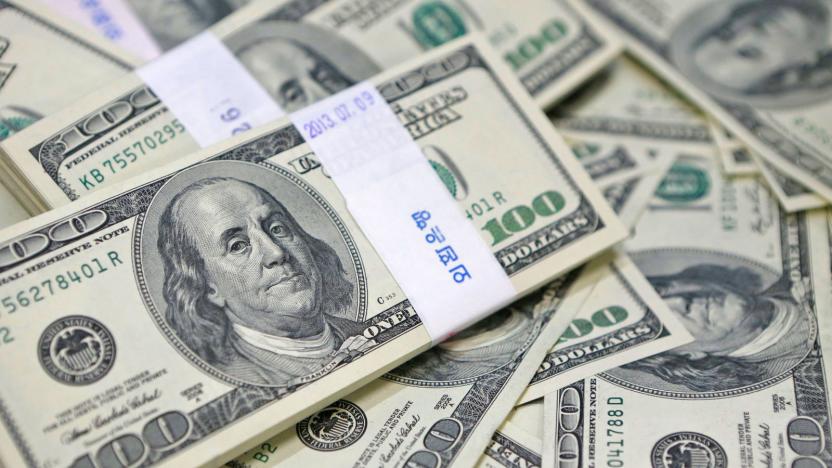
America’s cash-free future is just around the corner
Shake Shack's next burger joint at Astor Place in NYC doesn't want your money -- at least not the physical variety. In an effort to reduce the "friction time" between paying for your meal and eating it, the company plans to replace human cashiers for automated kiosks which won't accept actual bills and coins, only cards. This move is part of a global trend away from cash-based economies and towards Star Wars-style credits. But could such a monetary revolution actually benefit all Americans? Don't bet on it.
Andrew Tarantola10.06.2017
Alibaba reportedly expanding its empire with physical shopping mall
According to reports, ecommerce giant Alibaba is building a five-floor shopping mall near the company's headquarters in the Chinese city of Hangzhou. Aptly called "More Mall," the location is built on 40,000 square meters of land and is slated to open in April.
David Lumb09.05.2017
You can pay at a restaurant by smiling at a camera
As easy as it is to make purchases in the era of tap-to-pay services, it's about to get easier still. Alipay (which handles purchases for Chinese shopping giant Alibaba) has launched what it says is the first payment system that uses facial recognition to complete the sale. If you visit one of KFC's KPRO restaurants in Hangzhou, China, you can pay for your panini or salad by smiling at a camera-equipped kiosk -- you need to verify the purchase on your phone, but you don't have to punch in digits or bring your phone up to an NFC reader.
Jon Fingas09.03.2017
Chinese tech giant Alibaba has a smart speaker, too
Just days after news emerged that Samsung is working on its own AI-equipped speaker, Chinese giant Alibaba is also entering the fray. The Tmall Genie, which does a similar job to Amazon's Alexa, lets you control your home and offers news, music playback and a raft other skills via voice assistant AliGenie. Unlike Samsung's as-yet ephemeral offering, however, the Tmall Genie will be available on July 17th for the equivalent of $73.
Rachel England07.05.2017
Alibaba opens its mobile payment system to 4 million US stores
Chinese internet titan Alibaba has struck a deal to let its global AliPay customers buy things in the US through First Data, makers of the Clover point-of-sale system. Just don't mistake this for a full American expansion to compete with Apple Pay and Android Pay: The partnership is explicitly aimed to convenience AliPay's 450 million existing global users visiting the US.
David Lumb05.09.2017